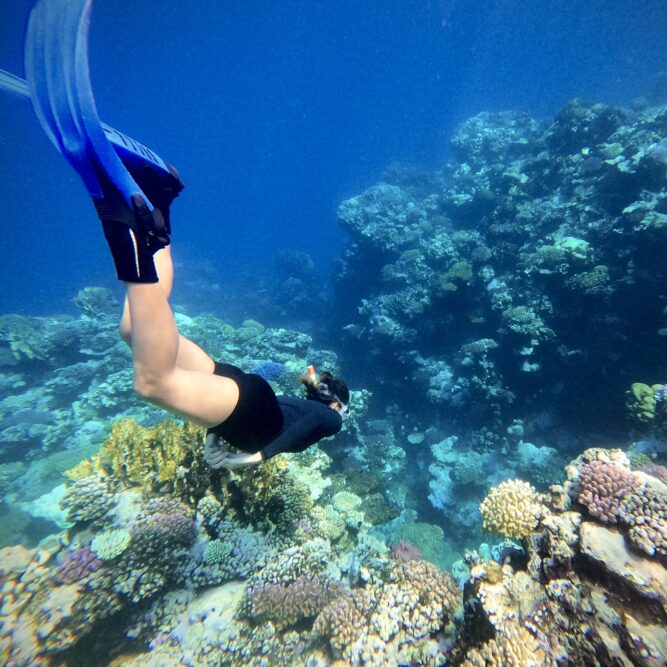EXTREME.E THE CHAMPIONSHIP OF “DUNE BUGGY” ELECTRICAL, MANAGED BY THE SAME ORGANIZATION AS FORMULA EPROMOTES ELECTRIFICATION, THE ENVIRONMENT AND EQUALITY
The championship of electric off-road cars, Extremes.E he threw his Legacy Programme in Saudi Arabia, on the occasion of the debut of the fourth season, al Desert X Prix. The extreme car championship test in the Saudi Kingdom, in Jeddah, which took place today, February 18, 2024, was dedicated to coral conservation.
The Extreme.E. championship
I Legacy Programmes they are initiatives or projects that aim to leave a positive and lasting impact that goes beyond the current moment. As for example, in the case of Extreme.E.
Extreme.E is the extreme off-road car championship, managed by the same organization as Formula E. To promote theelectrificationl’environment and theequalitySUVs and futuristic technologies are showcased in some of the world’s most remote and climate-threatened environments.
The goal of the competition is to promote the adoption of electric vehicles to pave the way for a future low carbon emissions and provide a cutting-edge motorsports platform in gender equality.
In fact, the eight teams are made up of one male and one female driver, who compete to highlight global issues and inspire the next generation.
To protect coral reefs
Il Legacy Programme focused on the global challenge of conservation and restoration of barriers corals and on the need to promote research and development, in collaboration with three bodies. Which are: G20 Coral Research & Development Accelerator Platform (CORDAP), King Abdullah University of Science and Technology (KAUST) e Ocean Revive. This last Legacy Programme is led by the professor Carlos Duarte of the Scientific Committee of the program series.
Coral reefs are essential pillars of biodiversity. They support, one in four, all marine animal species in the ocean. They also support the livelihoods of around a billion people and protect the coasts of vulnerable, low-altitude island states, for which conserving coral reefs is an existential question.
I supporter del Desert X Prix
For this collaboration, CORDAP will provide input on the global challenge of coral reef conservation and restoration. Furthermore, on the need to advance R&D towards the main goal of coral conservation. KAUST will support the creation of the largest coral nursery and the largest gardening project in the world on the island of Shushah, in the Red Seanew advances in coral ecology and other relevant technologies provided by King Abdullah University of Science and Technology.
Ocean Revive is a start-up at KAUST, which will provide the corals for the demonstration “coral transplant” – corals being animals -, as well as technological contributions.
An unforgettable experience
For this event of Legacy ProgrammeExtreme.E pilots explored first-hand the fragile nature of coral reefs and witnessed the crucial role they play in “assisted reproduction of corals”. Pilots later gained access to KAUST’s modern marine research facilities and attended a meeting with the University’s leading students.
Coral reefs, the first ecosystem at risk
The health of coral reefs it is at a critical stage. Coral reefs occupy less than one percent of the ocean floor, but are home to more than 25 percent of marine life.
The planet has lost about half of the global state of ocean coral reefs. Yet, due to their vulnerability to marine heat waves, the Intergovernmental Panel on Climate Change (IPCC) predicts that 75-90 percent of remaining corals could be lost to climate change. This will happen even if the most ambitious goal of theParis Agreementof keeping coral reef temperatures to within 1.5 degrees Celsius above pre-industrial values, would be achieved.
As a result, coral reefs are considered the first ecosystem to risk of functional extinction because of climate change.
Ahead of the Desert .
Coral is a vital part of the ecosystem in the Red Sea
The professor Carlos Duartemember of the Extreme.E Scientific Committee and world leader in biological oceanography and marine ecology research at KAUST, said he was «Honoured to support the latest championship legacy initiative in Saudi Arabia together with trusted partners such as CORDAP, KAUST and Ocean Revive.
Coral is a vital part of the ecosystem in the Red Sea and with the help of Extreme.E and our partners in the legacy project we can take an important step in supporting the conservation and restoration of coral reefs.
The health of coral reefs is crucial to the planet amid this climate crisis, and preserving and restoring them will have long-term impacts to support marine life, protect coastlines from erosion and conserve sources of food and medicine.”.
The 2024 calendar, fourth season
The extreme car competition consists of ten races, spread across five incredible locations, to highlight the effects of climate change.
“Extreme.E collaborates with changemakers to be part of the solution.”
17-18 February Saudi Arabia a Jeddah.
13-14 July Europa TBC
21-22 July Italy Sardinia
14-15 September Italy Sardinia
23-24 November 2024 USA Phoenix
To find out more click on Extreme E

